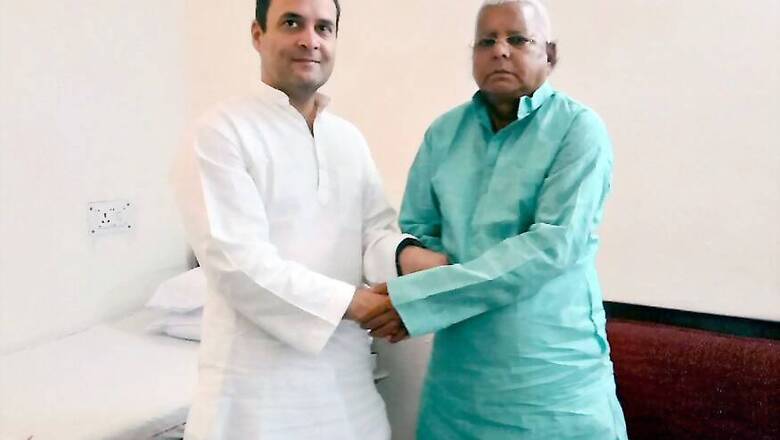
views
Patna: Rumblings in the Bihar Congress have surfaced after the poll debacle as a section of senior party leaders have demanded that the party sever ties with the Rashtriya Janata Dal (RJD). They have also sought that accountability be fixed for the election debacle and action taken against those state leaders who promoted their sons and ceded potential winning seats to other ‘mahagathbandhan’ allies.
In the firing line is Bihar Congress chief Madan Mohan Jha and state campaign committee chairman Akhilesh Prasad Singh who were responsible for seat-sharing, selection of candidates, and campaigning in the state.
A few of the leaders want the Congress in Bihar to stand on its own and chart its independent political course going ahead in order to become a potent political force in the state. Others claim that in the scenario of an alliance, the Congress should play the role of a ‘big brother’ and head the coalition.
Prominent leaders calling for changes include former Bihar Pradesh Congress Committee (BPCC) presidents Anil Sharma and Chandan Bagchi, former minister Abdul Jalil Mastan, Samastipur MLA Ashok Kumar Ram, Kadwa MLA Shakeel Ahmad Khan.
“If a coalition is needed, the Congress should be its big brother and have a say in ticket distribution and selection of candidates,” said former minister Shyam Sundar Singh Dheeraj.
Their demand is based on the premise that the Congress has not benefited from its alliance with Lalu Prasad Yadav – rather, it has lost its credibility by remaining as an appendage of the RJD for more than 22 years. “We have fought five Lok Sabha elections as the RJD’s ally but our seat tally has not increased while the RJD has taken the lion's share,” said MLA Ashok Ram.
The pro-changers claim that the Congress has lost its traditional base of upper castes, Dalits and Muslims since allying with the RJD. While the upper castes, disenchanted with Lalu, threw their weight behind the BJP, the Muslims sided with the RJD and the Dalit vote bank split between Dalits and Mahadalits after a decree by the Nitish Kumar-led government.
Their demand for retrieval of the Congress’ independent identity is also based on the fact that Lalu’s much-publicised Muslim-Yadav and backward caste vote bank went haywire in the Lok Sabha elections.
However, BPCC spokesperson Harkhu Jha said the party should mull over the causes of defeat and consider new ways to improve its tally in the next state assembly elections.
The only silver lining in Bihar is that the Congress’s vote share has increased from 6.7% in 2014 to 7.7% this time.
Lalu, who once led the entire gamut of backward caste votes in his heyday, has lost control over the Extremely Backward Castes (EBCs) who now stand behind Janata Dal (United) chief Nitish Kumar.
The Congress has gone through a rollercoaster ride in Bihar. From 1952 to 1984, the party always won a good number of seats except in 1977 when it was completely washed out as a fallout of the Emergency imposed by the then Indira Gandhi government.
During this period, the party’s Lok Sabha tally varied from a minimum of 34 seats, out of the 54 seats in the then united Bihar, in 1967 to a maximum of 48 in 1984. But in the nine Lok Sabha elections held since 1989, the Congress’s electoral fortune has varied between a minimum of one seat and a maximum of four.
The Congress’s worst phase in the state began after the 1989 Bhagalpur riots that took place when the party was in power. In the Lok Sabha elections that year, the Congress could win only four of the 54 seats as there was complete disenchantment among people. The Janata Dal, led by VP Singh and others, cashed in on the anti-Congress mood and won 32 seats.
The Congress’s electoral fortunes worsened when it sealed an alliance with the RJD in 1997 and formed the government led by Lalu’s wife Rabri Devi, who was installed after his surrender in connection with the fodder scam cases.
Since then, the Congress has never crossed the double-digit figure and in 2019 it could retain only one of the two seats it won five years ago. For 22 years, the Congress has existed as an appendage of the RJD led by Lalu who deliberately tried to weaken it in order to maintain the disharmony in its traditional upper caste-Dalit-Muslim vote bank.
In the state assembly elections, the Congress tally declined from 196 of the 324 seats in 1985 to 71 in 1990. In 1995, it could win only 29 assembly seats and the tally further decreased to 23 in 2000, 10 in February 2005 polls, nine in October 2005 polls, and four in 2010. In 2014, the party won 27 assembly seats after formally entering the grand alliance comprising RJD and JD(U).
“The Congress leadership must introspect as to why the Congress has been losing elections after entering into an alliance with the RJD in 1997. There is no need to remain in this alliance,” said state Congress leader and party MLA from Amour assembly seat Abdul Jalil Mastan.
The biggest dilemma for the Congress in the state is that the party had to ally with leaders who had emerged on a plank of anti-Congressism. Once again, the party stands battered by the Narendra Modi wave and it has an enormous task ahead in a state where assembly elections are due next year.




















Comments
0 comment